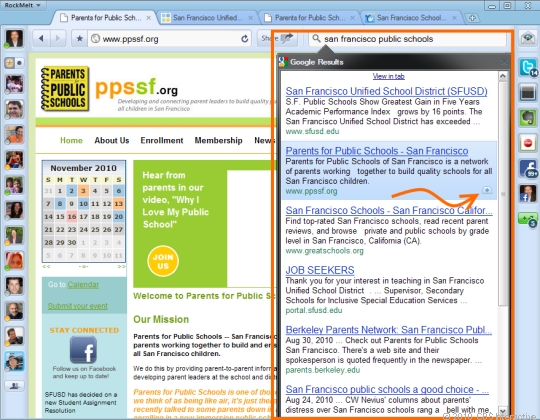RockMelt: Will this business model work?

The RockMelt social browser launched more than a week ago and now the startup launch hype has cleared, there were a few lingering questions about the company. We caught up with RockMelt CEO Eric Vishria to talk browser innovation, business models and a dash of open source.
RockMelt came out of the gate strong with its beta. The company also generated a fair amount of attention since Marc Andreessen, the guy that basically launched the browser, was a key investor as RockMelt raised roughly $10 million in funding. Andreessen's Andreessen Horowitz venture firm invests in early-stage startups. It also doesn't hurt to have Intuit founder Bill Campbell in your investor corner either.
Here's a recap of my conversation with Vishria with some color commentary.
On browser innovation front, I've noted that we're in a renaissance period. There's a speed race underway, upstarts are trying to innovate and it's a fine time to be a browser consumer. Vishria said RockMelt's approach was to take what people were already doing with the Web---social networking, consuming news---and put them in the context of a browser. "In the broader market, the interesting thing has been that everybody is moving in a similar direction. Browsers are going faster and lighter weight. Those are really good things," said Vishria. "When Chrome launched in September 2008 it sparked the latest round of speed wars," he explained. "Another thing that is happening is that the way people use the Web is really different. So while Firefox, Chrome and IE are coming at it one way, we're coming at it from a different direction."
So there's a convergence of Web activities and the browser? Vishria said history is repeating itself in some respects with the browser battle. In 2003 through 2005, there was the rise of "the leisure Web" as MySpace, Friendster, Flickr and YouTube emerged, said Vishria. "All of those sites were about entertainment and connecting with friends. People spent more of their leisure time online," said Vishria. But IE just was not that stable, he added. Firefox comes along with tabs, a search box and better products. "Fast forward to 2007 and 2008 and Chrome brings V8, a fast JavaScript engine," said Vishria. "That comes as there was a shift in complex Web applications. Performance really mattered and Chrome gained share."

"Today all browsers have the same features. We want to bring the notion of sharing, identity and having your friends built into the browser," he said. That's heady company to keep for RockMelt, but Vishria thinks that his company can take browsing to the next level.
But here's the problem. All browsers are embedded in larger companies---Microsoft, Google and Apple---or part of a lucrative non-profit like Mozilla. How will RockMelt bring in some dough? Vishria said that browsers make money. He noted that Mozilla is a lucrative non-profit and that browsers are profitable by renting out rights to their search boxes. "Search engines pay for rights to be the default search provider," said Vishria. "If you look at the browser that's only one service built in. We have search built in so we hope to make money when we have users, but we can build in other services. We can have commerce built in. Gaming built in. Each additional service can be monetized," said Vishria. "There's a huge opportunity to be a great independent company."
Vishria noted that the user could customize services in RockMelt's browser. Indeed, Gmail and Tumblr are popular requests as a new service. Hypothetically, RockMelt could garner millions of users and sell default service status to the highest bidder. It's a concept that could work. However, other browsers could replicate that model too. RockMelt's model sounds simple, but it's already proven. Mozilla raked in $104 million in revenue in 2009 from search deals---mostly Google.
Naturally, I asked what was defensible here. "Why does any small company beat a big company at anything?" asked Vishria. "We're focused. Chrome didn't exist two years ago. Firefox didn't exist before that. The history of this market is that newcomers can build better products, come in and disrupt. It all starts with users. The way we'll ultimately make money is to have users like and use the product. Our interests are aligned with users."
"We've just scratched the surface of what we want to do. This is our first beta," he said.
Whether RockMelt becomes a big hit remains to be seen, but one thing is certain: The company is a great example of how open source can accelerate development. Simply put, RockMelt wouldn't have the luxury of developing value added services if Chrome and Webkit weren't open source projects. "There's no question that the open source movement has been a big help," said Vishria. "Because Chrome and Webkit are open source, companies can benefit. We'll get all the latest speed improvements in addition to what we're doing on top of Chrome."
Related:
- What happens when a browser turns Facebook into Feedbook?
- The browser renaissance: Fun times with Mozilla's F1, RockMelt, advances galore
- RockMelt: 5 reasons to love it and one big reason not to
- RockMelt: The Next Social Browser
- Cavegirl Discover RockMelt, Throw Facebook Browser Through Window
- Rockmelt and the seismic plates of cloud
- RockMelt: Dumb or Stupid? You Decide